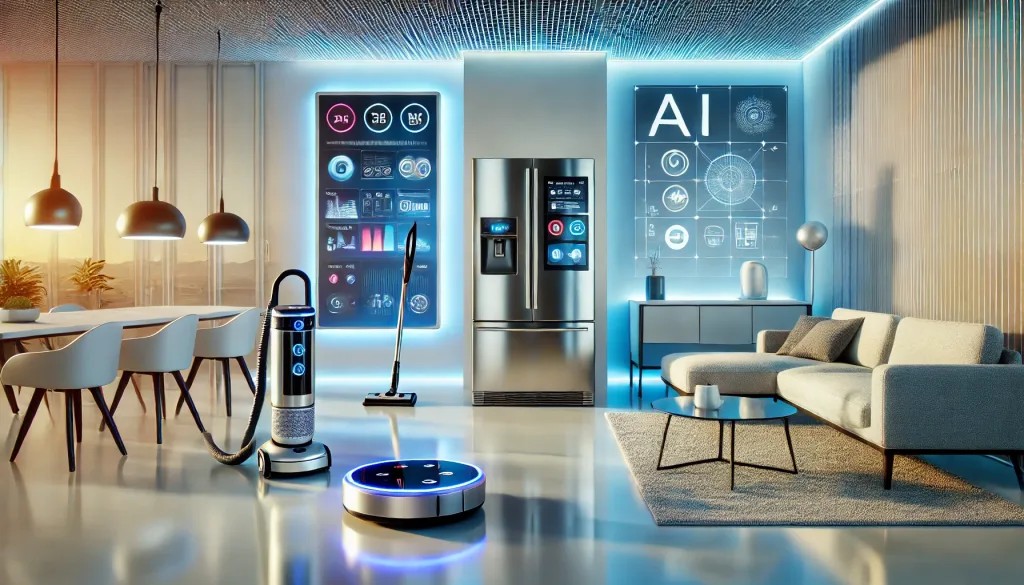The Evolution of Artificial Intelligence in Household Devices: Transforming Everyday Gadgets

Artificial intelligence (AI) is no longer confined to research labs or science fiction movies. It has seamlessly woven itself into our daily lives, revolutionising how we interact with household gadgets. From smart speakers that respond to voice commands to refrigerators that track your groceries, AI’s role in modern homes is more significant than ever. This article delves into the evolution of AI in household devices, its applications, and the impact it has on daily life.
The Integration of AI in Home Appliances
The integration of AI in home appliances has brought about a paradigm shift in how we perform daily tasks. By leveraging machine learning and predictive algorithms, appliances have become more intelligent and adaptive to individual user needs. This transformation not only simplifies chores but also enhances energy efficiency and overall convenience.
For example, AI-enabled dishwashers can detect the level of dirtiness in dishes and adjust water pressure and detergent use accordingly. Smart air conditioners learn your preferred temperature settings and optimise energy use, contributing to sustainable living while maintaining comfort.
These innovations are part of a broader trend where home appliances are no longer standalone devices but interconnected tools that work cohesively to make our lives easier and more efficient.
Examples of AI in Common Appliances
AI is manifesting in a variety of household gadgets, making them smarter and more functional. Refrigerators now come equipped with cameras that monitor the contents and provide suggestions based on what’s available. This helps reduce food waste by encouraging creative meal planning with available ingredients.
Similarly, washing machines with AI can automatically select the optimal wash settings based on the type of fabric and dirt level, minimising damage to clothes and saving water. Robotic vacuum cleaners, which once followed random patterns, now map out entire rooms and remember furniture layouts for future cleaning sessions, providing a meticulous and personalised cleaning experience.
These examples illustrate the profound impact AI is having on modern home appliances, setting a new standard for functionality and convenience in everyday life.
The Role of AI in Personalisation and Connectivity
One of the most significant advantages of AI is its ability to personalise user experiences. By analysing behavioural patterns and preferences, AI adapts and customises its operations to suit individual users. This has turned ordinary gadgets into highly intuitive companions.
Moreover, the integration of AI into smart home ecosystems has further elevated connectivity. These interconnected systems enable seamless communication between devices, allowing them to work together harmoniously to enhance overall living experiences.
Smart Home Ecosystems
Smart home ecosystems, powered by AI, have become a hallmark of modern living. Devices such as thermostats, security cameras, and lighting systems can now be controlled from a central hub or even remotely via smartphone apps. This convenience ensures that users can monitor and manage their homes at any time, regardless of their physical location.
For instance, AI-powered lighting systems can detect the presence of individuals in a room and adjust brightness accordingly, reducing energy consumption. Similarly, security systems equipped with AI can analyse live video feeds to identify unusual activities, providing real-time alerts and peace of mind.
These interconnected systems also learn user routines, such as adjusting the thermostat before bedtime or playing soothing music in the evening. This level of customisation not only enhances convenience but also creates a more comfortable and efficient living environment.
Challenges and Ethical Considerations of AI in Homes
While AI offers numerous benefits, its adoption in household devices also presents significant challenges and ethical concerns. From data privacy to job automation, these issues must be addressed to ensure responsible development and use of AI technologies.

Privacy and Data Security
AI-driven devices often require extensive data collection to operate effectively. This data includes personal preferences, daily routines, and even sensitive information like voice commands or facial recognition data. While this data is crucial for delivering a personalised experience, it raises legitimate concerns about privacy and security.
To mitigate these risks, manufacturers must implement robust encryption protocols and transparent data usage policies. Users should also be educated on best practices for securing their devices, such as updating software regularly and using strong passwords.
Beyond privacy concerns, the ethical implications of AI adoption extend to issues like bias in algorithmic decision-making and the potential for misuse. Addressing these challenges will require collaboration among developers, policymakers, and end-users to create a framework that prioritises ethical AI practices.
As AI continues to evolve, its integration into household devices will only deepen. While these technologies enhance convenience and efficiency, it is essential to balance innovation with ethical considerations to maximise their benefits for society. With the right safeguards in place, AI has the potential to redefine modern living and make homes smarter, safer, and more sustainable.




